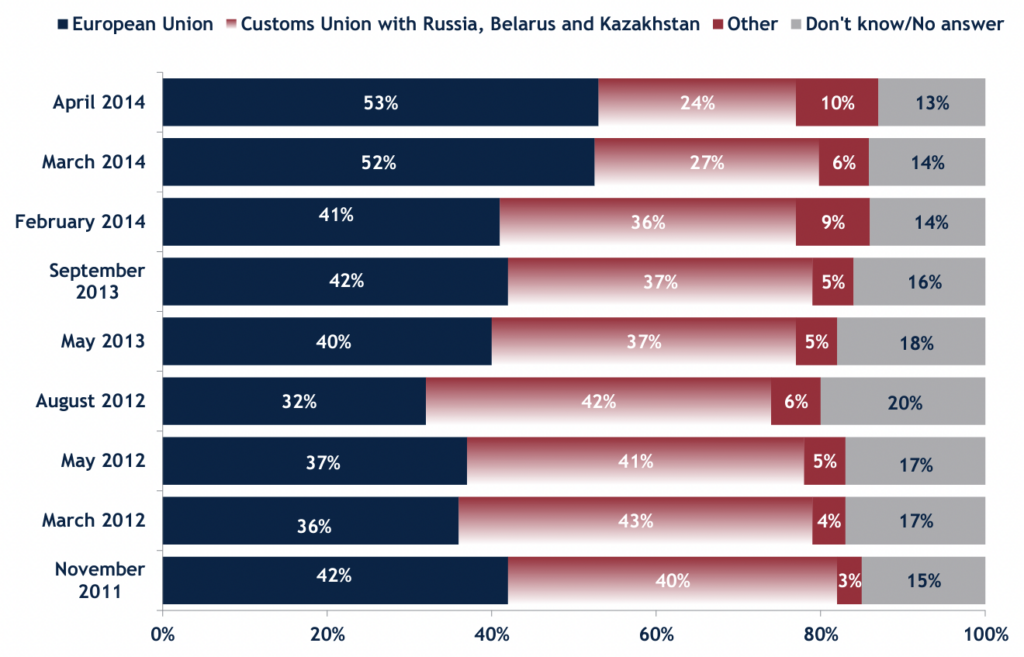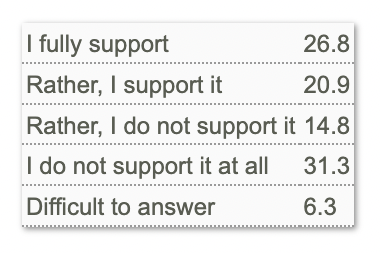Since Russia’s invasion of Ukraine began, Western commentators have spent a huge amount of time expressing moral outrage at Russia’s actions, but comparatively little time thinking about how the war could have been prevented.
This is puzzling. Even if Ukraine manages to win, this victory will have come at an enormous price – tens of thousands of lives, millions of refugees (many of whom may never return), and untold damage to the country’s infrastructure. No matter what the outcome, the war will have been disastrous for ordinary Ukrainians.
It therefore seems essential to ask whether it could have been prevented.
One possible way it could have been prevented is through deterrence. NATO members could have announced in advance, ‘We commit to defending Ukraine if it is ever attacked by Russia’. Alternatively, the U.S. and its allies could have armed Ukraine to the teeth by transferring huge quantities of offensive weapons.
The disadvantages of this approach are obvious. It might have caused Russia to invade even sooner to forestall the arrival of NATO troops or weapons. And if Russia did call the West’s bluff, it might have sparked World War III, as NATO would have pre-committed to entering the war on Ukraine’s side.
There’s another possible way the war could have been prevented: through the implementation of Minsk II. This was an agreement signed in 2015 by representatives from Russia, Ukraine and the two separatist republics, which aimed to bring an end to the fighting in Donbas. It was based on a plan drawn-up by the leaders of France and Germany.
Although Minsk II ultimately failed, since neither side honoured the terms, it was unanimously endorsed by the UN Security Council.
Critics of Minsk II say it was too favourable to the Russian/separatist side. This is because the agreement would have granted significant autonomy to the two Donbas regions, allowing them to veto Ukraine’s future membership of NATO and possibly its membership of the EU as well. (Minsk II is roughly equivalent to the plan John Mearsheimer put forward in 2014, which emphasised Ukrainian neutrality.)
For Ukrainians who aspire to fully integrate with the West, not being able to join NATO or the EU represents a major loss. Yet a significant minority of Ukrainians want to remain close to Russia, and for them fully integrating with the West represents a loss.
As late as February 2014, the percentage of Ukrainians who wanted to join the EU was only 5 points higher than the percentage who wanted to join the Eurasian Customs Union. The balance of opinion then shifted after the ‘Revolution of Dignity’.

Likewise, almost half of Ukrainians opposed the Maidan protest movement, including a plurality who “[did] not support it all”. For this reason alone, calling the subsequent change of government a ‘Revolution of Dignity’ is highly dubious.

The fundamental problem for Ukraine was that a majority of citizens sought closer ties with the West, but a significant minority sought closer ties with Russia, and these two aspirations were mutually incompatible.
You might say that in a democracy, the majority gets to decide the future path of the country, so Minsk II was fundamentally unfair. Yet it’s widely understood that in ethnically divided countries, the majority often has to make concessions to the minority for the sake of overall stability. Half the parliamentary seats in Lebanon are reserved for Christians and half for Muslims, regardless of the ethnic make-up of the country (which no one quite knows), to prevent one group from dominating the other.
In any case, the European interest – as judged by the leaders of France and Germany – was preserving stability in Ukraine, rather than ensuring the country’s pro-Western majority got its way.
According to the New York Times, the plan for Minsk II emerged “in response to reports that lethal assistance was now on the table in Washington”. In other words, the U.S. wanted to start supplying Ukraine with offensive weapons, so France and Germany stepped in to broker a peace deal before that happened.
Why did Minsk II fail? As I’ve already stated, neither side upheld its end of the bargain. Yet historian Anatol Lieven argues it could have worked but for “the refusal of Ukrainian governments to implement the solution and the refusal of the United States to put pressure on them to do so”.
Lieven’s argument is consistent with numerous public statements made by Petro Poroshenko, the former Ukrainian President under whom Minsk II was signed.
In 2020, a Radio Svoboda journalist asked him whether he signed Minsk II in order to “buy time”. Poroshenko replied, “Of course”. He also said he was “categorically against” granting “special status” to the Donbas because it would lead to the “federalization of Ukraine”.
In June of this year, he told a different Radio Svoboda journalist, “We achieved what we wanted … our task was, first, to avert the threat, or at least to postpone the war – to secure eight years to restore economic growth and create powerful armed forces” (skip to 00:20:20).
He said the same thing on German TV: “What is the results of the Minsk agreement?” Poroshenko asked. “We win eight years to create army. We win eight years to restore economy. We win eight years to continue the reforms and to move to the European Union” (skip to: 00:07:20).
And just last week, he fell victim to two Russian pranksters (the same ones who pranked George Bush) and admitted, “I need this Minsk agreement for having at least four and a half years to build Ukrainian armed forces … to train Ukrainian armed forces together with NATO, to create the best armed forces in the Eastern Europe, which was built on the NATO standard” (skip to 00:05:00).
All this suggests that, even if the Russian/separatist side had taken the initiative in upholding their end of the bargain, Poroshenko never intended to implement Minsk II.
His stance was echoed by Ukraine’s Foreign Minister Dmytro Kuleba in February of this year. Mere weeks before Russian tanks rolled across the border, he told a Polish newspaper, “None of Ukraine’s regions will have a right to veto the state’s decisions. That is engraved in stone!”
But why, as the country’s main backer, did the U.S. not pressure Ukraine to implement the agreement? After all, the U.S. endorsed the agreement in its capacity as a member of the UN Security Council, and the U.S. pressures its allies to do things all the time.
The obvious reason is that U.S. interests were not served by the implementation of Minsk II.
From a Western perspective, preventing the war in Ukraine would have required the French and Germans to act more decisively, or the Americans to look beyond their own interests. Unfortunately, neither of these eventualities came to pass.










To join in with the discussion please make a donation to The Daily Sceptic.
Profanity and abuse will be removed and may lead to a permanent ban.
What pebble/flint wall would not be improved with a couple of heat exchangers in front of it? Lovely!
Hilarious.
And there choc full of expensive copper matrix piping! Worth a small fortune at the scrapper, not that anyone would steal them!
Well, that’s recycling covered then.
It’ll be fun for new build cul-de-sacs residents when there are 8 or so houses all facing each other with their blowers going 24/7.
The owner of a semi-detached house in a road near me, in Kew, south-west London, has just installed a large one of these in the small front garden. Watch out for more of this!
On the other hand, the noise our woodburner makes is lovely. Our friends and neighbours often remark upon it when they visit.
It’s so cosy, with all the crackling and popping.
Oh, and it makes the house warm, unlike the boondoggles mentioned above.
And no horrible bills in the post, either!
And you’re using renewable energy, to use the modern slogan. More efficient than Drax power station, quite likely.
So, if they’re too noisy within 1 metre of a neighbour’s door or window they’re going to be fine nearer to your own? If most people wouldn’t do it to their neighbour they won’t do it to themselves,
For the eco-cult, no hardship is too much. These are the people who think taking five hours for a 2h journey is brilliant because their EV is saving the planet, one cobalt child-miner at a time.
wink
For many situations it is clearly the case that if you do away with oil/gas boilers, the eco alternatives do not work on the basis of each property having its own source of heat. There have been some pioneering work on district heating schemes with one going ahead at Swaffham Priors;
https://tp-heatnetworks.org/trailblazer-swaffham-prior-becomes-first-uk-village-to-retrofit-a-renewable-heating-network-into-an-existing-community/
And so yes you can have a replacement for oil[gas boilers but the answer for many is not a simple case of swapping a boiler for a heat pump. District heating schemes do work in various parts of the world but they are not a simple 5 minute fix. They are technically, financially and administratively complex. It will take longer than 2050 to bring in significant district heating schemes across the UK.
And while it may be viable for brand new developments, it might not be practical for most housing areas. There are loads of existing utility pipes and cables buried underground already. Installing a whole load more hot water ones would be fun.
As far as I can ascertain, the smallest heat pumps use 4 kw an hour, and their efficiency depends on longevity,(and outside temperature)don’t turn them on and off, leave them running, Reepham as an example!
The direction of travel for our prosperity, well being and life expectancy is all downhill. —–Welcome to the 21st century where capitalism and standard of living is to be REVERSED.———- All allegedly for the “children and grandchildren” and “saving the planet”. ———Do the children and grandchildren want to be the first generations to be less well of than their parents since the Industrial Revolution that brought us out of the abject misery of dying young after a life of back breaking Labour? Well they have no choice in the matter because that is what is happening. ——–With the seemingly plausible excuse of a climate crisis, which upon closer inspection is not supported by one iota of science.—–Roll up Roll up . get your heat Pumps while stocks last and make sure you stock up on extra pullovers and thicker curtains.